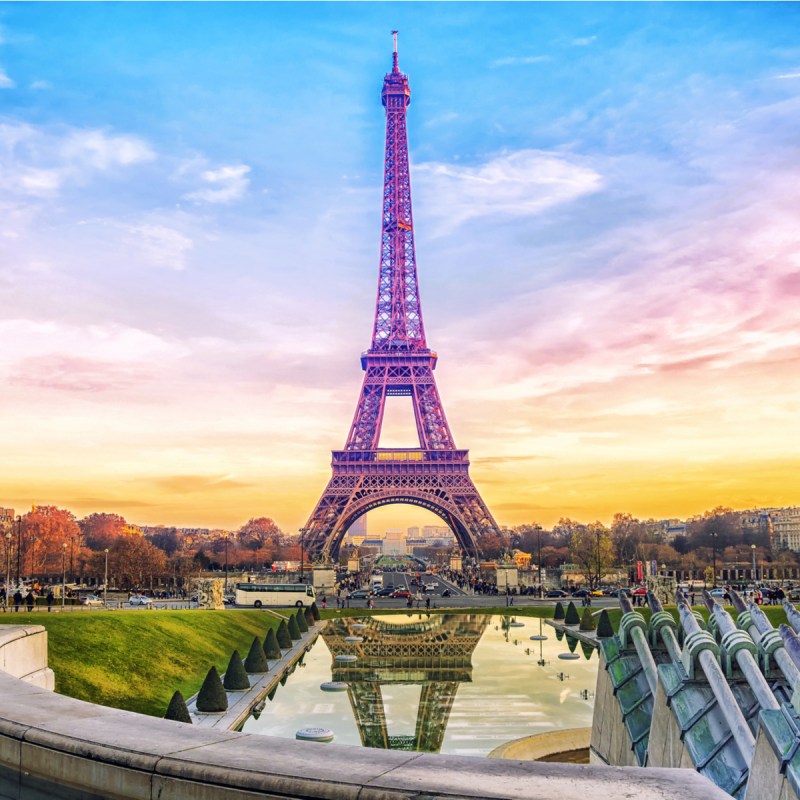
So, you finally booked your dream trip to Paris and are probably counting the days until you fly to the City of Light. The next thing you have to figure out is how to prepare for your maiden voyage — what to bring, what not to bring, what to know beforehand, what to know while you are there, whether you should have euros ahead of time, and a host of other things.
Videos by TravelAwaits
I moved from New York to Paris permanently in 2005 and made at least a dozen trips before I moved here. Since I’ve been living here, I’ve given thousands of walking tours to American and international clients and now know the essentials you should bring before you arrive.
I’ve prepared a comprehensive list of things you should know and do before your trip, so your dream vacation will go as smoothly as possible.
1. Passport Requirements
If you are a U.S. citizen, you must have a U.S. passport that doesn’t expire for at least nine months after your arrival, otherwise, you will not be able to board your flight. This happened to one of my tour clients. She had booked a week of tours with me and when she was trying to board her flight, her husband’s passport was set to expire in three months, so he wasn’t able to board the flight, and they had to cancel their trip.
2. What To Pack
First thing first: Pack at least two pairs of your most comfortable shoes because Paris is mainly a walking city, and you don’t want to miss anything if your feet hurt. Sneakers or shoes with thick rubber soles work best, and make sure they are broken in before you leave. Packing a pair of dress shoes is a good idea, too.
Put Paris in your weather app on your cell phone, and check it a few days before you leave so you can pack accordingly. Always bring an umbrella and a light raincoat. If coming in March, April, May, September, or October, it’s best to pack and wear layers because the temperature can vary greatly between morning and afternoon. On a typical April morning, it could be 38 degrees F at 9 a.m. and the temperature could go up to 60 degrees F by 2 p.m. A lightweight nylon or polar fleece vest or zip cardigan under a medium-weight coat or jacket is perfect so you can peel it off when it gets warm and then fold it up and put it in your bag or backpack.
If you are a jogger or runner, pack your shorts or sweats because running is a fantastic way to soak up Paris sites such as the Seine River, the Tuileries park, and the Luxembourg Gardens.
Pro Tip: If you forget anything, don’t sweat it. Paris has more shops than almost any city in the world, so you’ll easily replace what you forgot, and also have a cool souvenir from Paris.
3. Mobile Phones And Other Electronic Devices
There are two choices for cell phone service when you are in Paris. You can purchase a plan from your service provider from back home that includes international service. It will be a daily rate or a flat rate for an extended period of time.
The other option is to purchase a local SIM card and install it in your phone if you have an unlocked phone.
If you use the first option, make sure you turn off your data roaming service, otherwise, you will get socked with a shocking phone bill when you arrive back home.
As far as laptop computers, tablets, Kindles, and other similar devices go, they will work fine here, and almost all hotels and apartment rentals have free Wi-Fi.
France uses 220 – 240 V but the U.S. uses 120V, therefore the plugs are different, Buy at least two electronic plug converters, and more if necessary, so you can recharge your phone, computer, camera, et cetera. Some updated and newly opened hotels may already have the converted socket so you can use your American plug. If you forget to pack your converter plugs, you can ask the hotel if they have one you can borrow and you can easily purchase one at most electronic shops. You can buy a single converter plug for as low as $7 or you can buy a set that includes plugs for China and the UK.
4. Museum And Attraction Tickets
A smart idea is to book your museum and attraction tickets ahead of time, which will save you time and sometimes money. Although it takes more time to book your tickets individually at each site, it’s less expensive than buying a museum pass, unless you are planning to visit two or more museums a day. Also, make sure you book tickets directly on the museum’s or attraction’s site, rather than a third-party site such as Get Your Guide or Viator since these sites charge more than the museum sites do. This is the case especially with the Eiffel Tower, so purchase tickets directly here.
It’s also best to print out a copy of the tickets, as some sites only accept physical tickets.
5. Restaurant Reservations
A number of Paris restaurants have online reservation systems, so it’s easy to book ahead. If the restaurant doesn’t have an online booking system, call the concierge at your hotel before you arrive and ask them to make the reservation.
Most restaurants start their dinner service at 7:30 p.m., so don’t count on eating dinner any earlier, unless you go to a cafe, and then you don’t need a reservation. Just as a precaution, you or your concierge should call the restaurant the day before your reservation to confirm.
6. Money And Credit Cards
Almost all restaurants, cafes, shops, hotels, and other establishments take credit and debit cards. Bring at least two credit cards, preferably either a Visa or Mastercard, because many small establishments don’t accept American Express or Discover.
The euro is the currency used in France. Purchase a minimal amount of 50 to 100 euros at home, just to have when you arrive, but not more than that, because the exchange rate is much better when you exchange your money here. The easiest and safest way to attain euros in Paris is to use an ATM machine, as they have the best exchange rates. However, be aware that at certain ATMs, when you punch in the amount you want, it will then ask you if you want it taken out in euros or in USD, make sure to choose the euro option. For example, I have a Chase Bank account in the U.S. which I still use from time to time, and last week I took out 100 euros. The ATM asked me if I wanted to have $128 USD taken out of my account or if I wanted to take it directly in euros. I chose the second option, and it was $121 instead of $128 — a substantial difference. There may be an ATM fee of $3 to $5 from your bank back home, depending on what type of account you have, but it’s still worth it.
The only place where you may need large amounts of cash is at the Paris Antique Flea Market, where some vendors don’t take credit cards.
7. Travel And Medical Insurance
It’s a wise idea to buy travel insurance, especially when traveling to a foreign country. As far as medical services, France has one of the best medical systems in the world, and is always in the top five list, even ahead of the U.S., at a fraction of the cost. Almost all general practitioners charge less than $50 for a visit. If it’s something more serious like a hospital visit or emergency surgery, it is possible that you will only be charged a minimal amount, as the government will sometimes forgive most of the cost. The American Hospital, in a suburb just outside of Paris, is known for its excellent service and highly trained doctors who all speak English. (Note that you may be charged full rates at the American Hospital). I had serious surgery five years ago at a French hospital, and I had the best care I’ve ever had in a hospital.
8. Safety Tips
Paris, for the most part, is a safe city, with very little violent crime. The only thing is you have to beware of pickpockets, which are prevalent at most major tourist sites, such as the Eiffel Tower, the Louvre, Champs Elysees, and Montmartre. To protect yourself, put your money and credit cards in a safe place, like an inside pocket, or for extra safety, a money belt under your shirt. Do not put valuables in a backpack, and women, don’t put valuables in your handbag.
Be alert if a stranger comes up to you and asks if you speak English. Most of the time it will be either a pickpocket or someone trying to scam you into giving them money. Just ignore them.
Editor’s Note: Headed to Paris? Do not miss Richard’s 9 Ways To Avoid Looking Like A Tourist In France.
